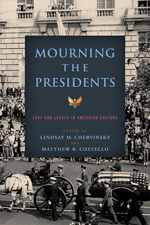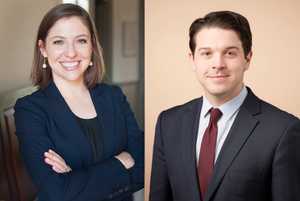Today, we are happy to bring you our conversation with Lindsay M. Chervinsky and Matthew R. Costello, editors of MOURNING THE PRESIDENTS: Loss and Legacy in American Culture.
What inspired you to edit this book?
In November 2018, former President George H.W. Bush died and we observed the overwhelming bipartisan response to his funeral. Friends and former foes came together to celebrate Bush’s life and legacy. Many of the reflections and tributes drew a stark contrast with Bush’s humility and kindness to the current political climate, which said as much about Bush as it did American culture in 2018. We figured that might be the case for previous presidential deaths as well, so we pulled together a volume featuring award-winning historians, public historians, and directors of presidential libraries to explore the idea.
What did you learn and what are you hoping readers will learn from your book?
Lindsay: I hope that readers will see how Americans have always remembered presidents selectively—they focus on what they want to remember, rather than the full story. For example, in the Zachary Taylor chapter, Dr. Camille Davis shows that Americans focused on his military record prior to the presidency, rather than the lackluster presidency. But that choice said as much about Americans at the time as it did Taylor.
Matthew: The presidency, and by extension the presidents, can be used to introduce people to all kinds of fascinating research and perspectives. While our work focuses on memory and legacy, new scholarship around the presidents with different methodological approaches is flourishing.
What surprised you the most in the process of editing the book?
Lindsay: I was surprised by how sad I was reading the Reagan chapter by Chester Pach. If all the presidents covered in the volume, Reagan’s death was the least surprising, and yet something about the long, slow decline really got to me. That emotion is a testament to Pach’s writing, but also the love story he was able to capture between Nancy and Ronald Reagan.
Matthew: How differently each contributor approached the concept of “legacy”. Some looked to family histories or historiography; others presidential libraries or private organizations; and some monuments and memorials. Even the concept of legacy has many manifestations, which underscores not only the differences in what people remember but also how we remember.
What’s your favorite anecdote from your book?
Lindsay: Abraham Lincoln died on Saturday, April 15, 1865. By the end of the day, the department store in New York City, A.T. Stewart’s, had sold $100,000 (in 1865 dollars) in black goods to Americans who were eager to participate in the mourning process.
Matthew: During the national day of mourning for Theodore Roosevelt in 1919, a group of 75 suffragists outside the White House attempted to burn an effigy of President Woodrow Wilson for not supporting women’s suffrage. While it wasn’t an official tribute, I think Roosevelt would have appreciated their dedication and very much enjoyed the spectacle at Wilson’s expense.
What’s next?
Lindsay is finishing a book on the presidency of John Adams, exploring how he carefully cultivated norms and customs that define our political system, including the peaceful transfer of power, and worked to preserve the presidency for future generations. As Americans, we’ve really taken his administration and these norms for granted, but Adams did not.
Matthew is completing a book on Theodore Roosevelt and the Roosevelt family’s time in the White House. The book chronicles TR’s ascent to the office and how the Roosevelts and their staff transformed the home and office to meet the demands of the modern American presidency.





